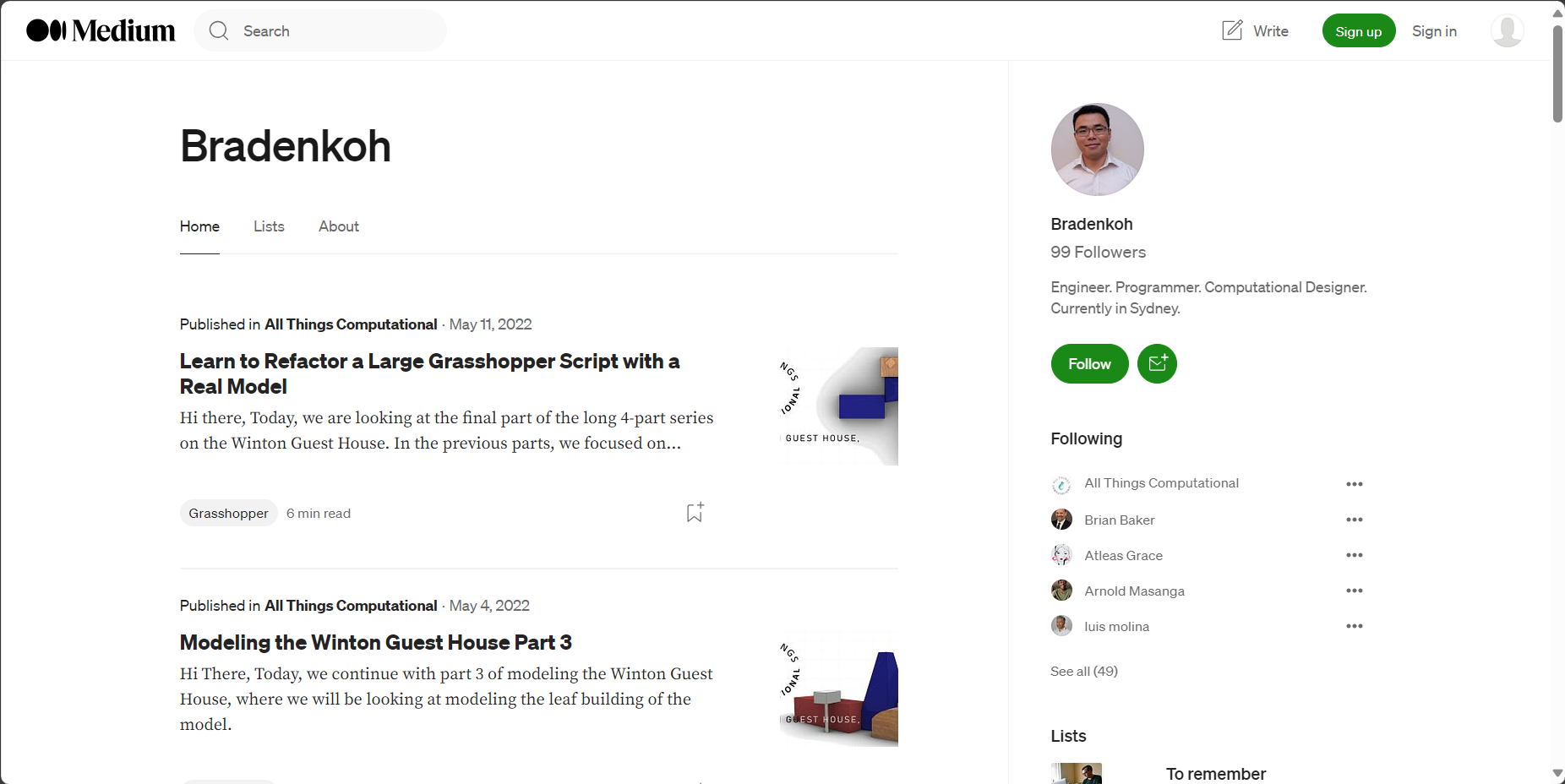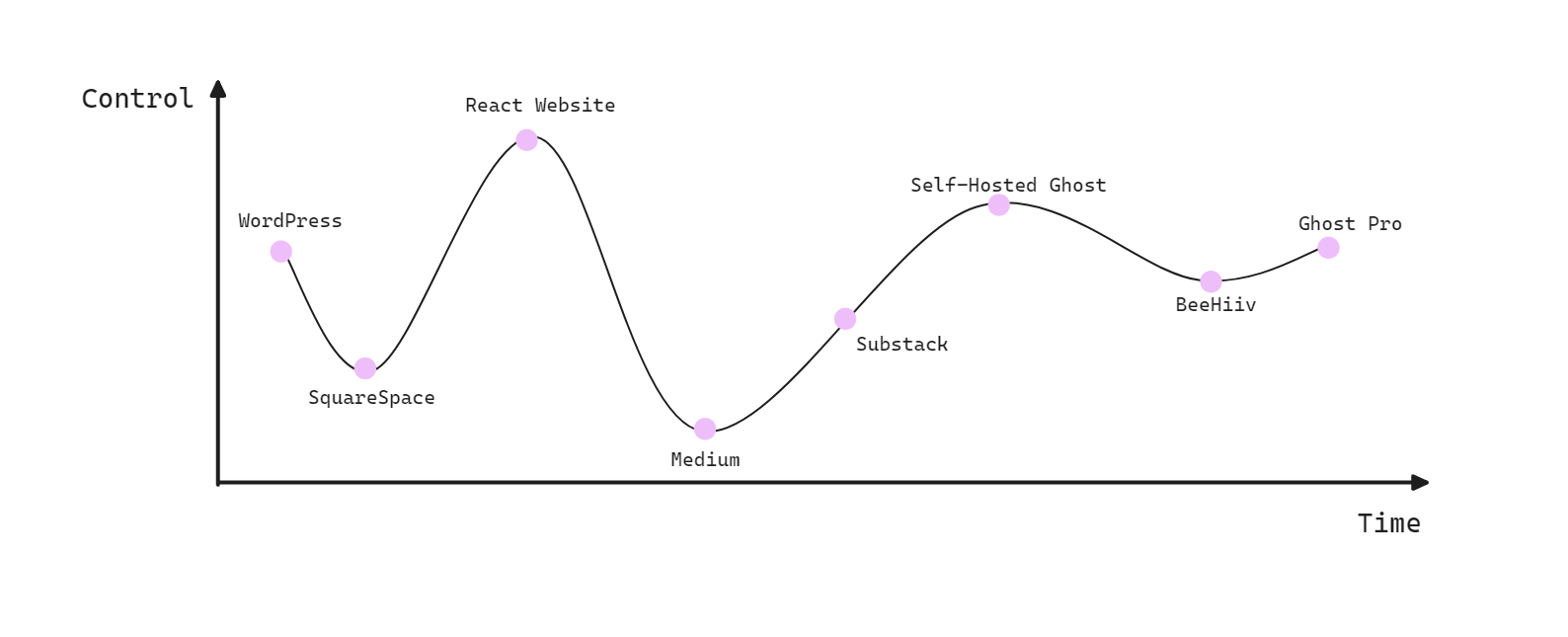The Making of Bradenkoh.com
When I first started this creator journey, I had always wanted to have a website. I like the idea of having a place to store and present my work to the world.
My "website" has gone through several iterations and I write this in hopes that the lessons I have learnt will be useful to anyone looking to create their website. This isn't going to be a technical article though. I am not going to go through how to find a domain or choosing a tech stack. Instead, it's about the bigger picture and some things you want to consider before making one.
Brief History
To understand my perspective, it's useful to start with a brief history of my "websites." I use the term "website" quite loosely here because some of my "websites" were just profiles set up on platforms like Medium or Substack.

In the beginning, all I wanted to do was to write online about topics that I found interesting. These were topics like productivity and self-help. I only did so because I was new to the space and found what I was learning extremely helpful. I also think anyone in these spaces tends to want to blog.
Having some web development experience, I chose WordPress as my first platform. But it wasn't enough to choose a platform, I also needed to learn how the web worked in general. Things like domain names, DNS or even how to set up email were all new to me.
Today, I've moved away from WordPress and through a series of experiments, I am now using Ghost Pro loaded with a custom theme that I designed. The journey here has been a constant battle between control and ease of use.
If I were to chart my tech stack evolution, it would reflect my shift from pure blogging to incorporating newsletters, marketplaces, email courses, and more. Each time I felt constrained by a platform, I changed platforms.

My choice to stick with Ghost Pro so far was mainly because it gave me a lot of control, integrated well with services like ConvertKit, and has an excellent content management system.
So, if you're trying to make your website, here are some points to consider.
Personal vs a branded website
Choosing a name for your website is crucial. Despite advice suggesting that naming will slow you down, your internet identity matters. It helps to be intentional with your name on the internet.
Throughout my journey, I oscillated between using my name and a brand name, eventually settling on my name to ensure the website truly represents me and my work. But it took me a long time to get to where I am now. So, I think what you call yourself on the internet matters.
But that doesn't mean that you should spend forever on a name. Naming is important but so is moving forward and getting started on your website. It's a balance between speed and procrastination. What helped me decide was my intention for my website.
I started out writing about productivity, so I used my own name because I wanted to be like a coach to people. Then, when I was on Substack, I used a brand name because I started writing about computational design, I thought the writing would be better if it came from a brand rather than myself. I have now settled on using my name because a brand name felt too hollow and since I wasn't offering any services, my name just made sense to me.
The decision between a personal name and a brand name may boil down to the intention of your website. This brings me to my next point.
The Importance of Focus
My early days on WordPress were focused on productivity articles. As my interests expanded, so did my topics. This meant after 6 months of writing online I started to write about finance, health, fitness, etc. This was a mistake because not only did I cut my reputation before it had any chance to grow, but I also diluted the focus of my website with all these random topics. It meant that I couldn't build my credentials with people because I kept switching topics.
It felt like a good idea at the time, after all, I wanted to write what I found interesting and that was everything but to the people online, it made me look like a jack of all trades, master of none. Not to mention, because I switched topics so often, most of what I wrote about was too shallow to be useful to people.
When I came to that realisation, I started to focus only on writing about computational design, a topic that I am extremely passionate about. The single focus gave me a lot of clarity and direction. It helped me better design the website's messaging, layout and interface. This "projects" area is the only space that I allow myself to write about things outside computational design.
The constraint of a single focus gave me the most freedom. So, I think it's really important to consider your focus on your website.
But of course, the focus of your website can be limited by the platform you choose. I know I said that I won't dive into tech stacks but I find that I need to talk about some of it because it impacts what you can create on the internet.
Choosing a platform/tech stack

As the history of my website has shown, I tried many different platforms. The reason was that I lacked direction and was still exploring what I wanted my website to be. The bonus side effect was that I now have a good understanding of what you can do on the internet.
With the right skill and time, you can do almost anything on the internet but to avoid wasting as much time and effort as I did, I think it's worth considering what you want your website to be. Just take a moment and ask yourself whether you want a blog, a portfolio for work, a storefront, a combination of everything, etc.
When I was only interested in writing online, I chose platforms like Substack and Medium because I didn't want the hassle of setting up a site. That was fine for a while until I wanted more and I made the effort to migrate again. But what I should have done is pause and take a moment to think about what I wanted to do online.
If I did that, I think I would have reached Ghost a lot earlier and it would have saved me a lot of time and effort.
A lot of times when things are new and you are exploring, it's good to try as many options as you can but a bit of direction and reflection can help cut all that effort.
New Website Checklist
There are many new things to learn about creating your website. To help with that, I have compiled a rough checklist to get started.
Website Information
- Decide on a focus (What do you want to do with your website?)
- Do you want to share your thoughts (blog), sell something, or teach something? You can even think about starting a community
- Decide on a name (personal or branded)
- If you can't decide, make it personal and switch it later.
- Once you do, get a domain, I use Google domains (which are now owned by Squarespace)
- Choose a platform (this can be Squarespace, WordPress, Ghost, Substack, etc.)
- Learn how to link your domain name to your platform (this is using something called DNS)
- Spend some time and get to know the platform. Learn what it can and cannot do. I didn't like the limited customisations on Substack or Medium.
If you want to create a Newsletter
- Link your domain to an email provider (I use GSuite but there is also Office 365 )
- It's generally bad practice to send something from @gmail.com or @outlook.com. Instead get an email for your domain, so you can send emails that look like [email protected]
- Optional: Get an email marketing tool (I use ConvertKit)
- You don't need this if you are using a platform like Substack/Medium because it does that for you.
- I use ConvertKit for the automation and tagging feature. It's how my email Grasshopper course works.
Final Thoughts
The most significant lesson for me was understanding and finding my intention with my website. Early iterations of my website felt unfocused, shallow and messy. It took time to understand that I wanted to focus on computational design and once I did, everything just clicked into place.
But, the future isn't set in stone and I might pivot away from computational design in the next few years. The key lesson here is to find that intention or focus that gives you direction, even if that may change later.
When I look back on my journey, I don't regret going through as many iterations as I did because I genuinely learned a lot. But part of me wishes that I had sought out a clear direction sooner.
